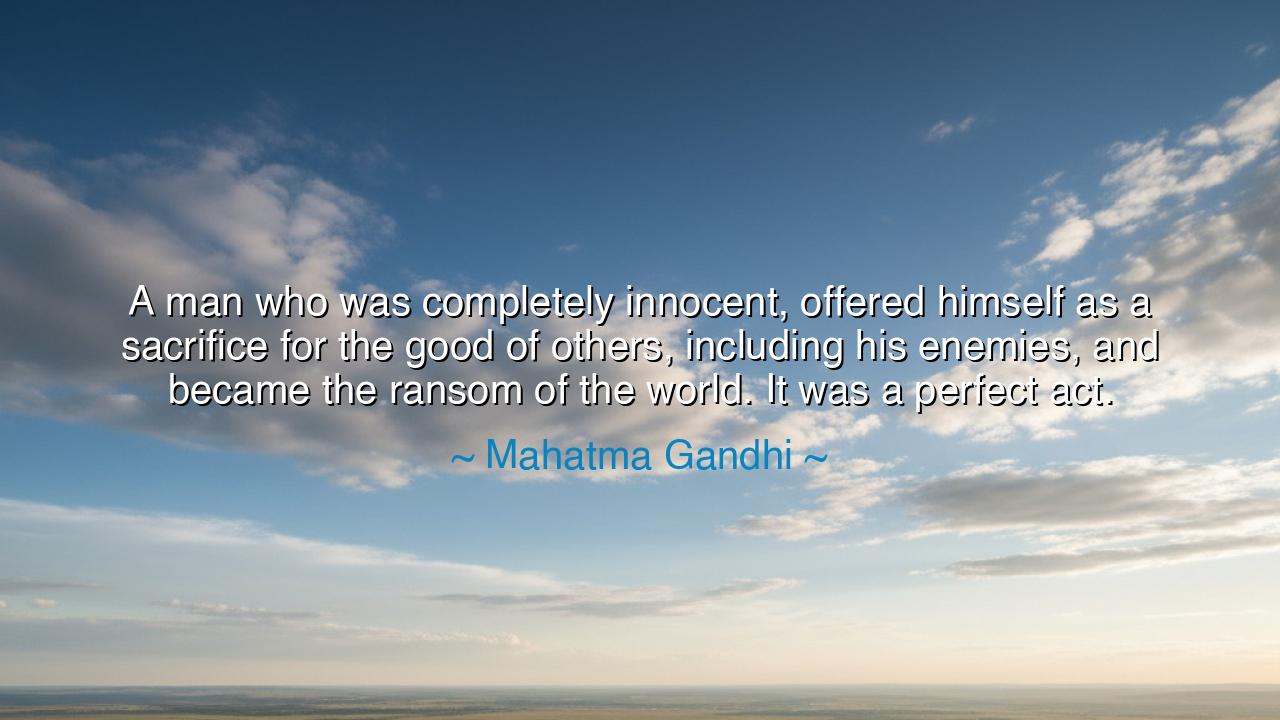
A man who was completely innocent, offered himself as a sacrifice
A man who was completely innocent, offered himself as a sacrifice for the good of others, including his enemies, and became the ransom of the world. It was a perfect act.






The words of Mahatma Gandhi — “A man who was completely innocent, offered himself as a sacrifice for the good of others, including his enemies, and became the ransom of the world. It was a perfect act” — echo through time like a sacred hymn of compassion and redemption. In these words, Gandhi speaks not only of Jesus Christ, but of the eternal principle of selfless sacrifice, a power so divine that it redeems not only the oppressed, but even the oppressor. This quote is both a meditation on the life of Christ and a reflection of Gandhi’s own spiritual path — a life dedicated to the belief that love and sacrifice are stronger than violence and hatred.
In the style of the ancients, one might say: the act of offering oneself, without sin, without vengeance, without expectation of reward, is the highest expression of human and divine nature. Gandhi saw in Christ’s crucifixion the ultimate embodiment of ahimsa — the principle of nonviolence that he himself lived and preached. To suffer willingly for the sake of truth and compassion, even for one’s enemies, is the most perfect victory of the soul over the world. For what power can conquer a man who meets cruelty with forgiveness, and death with love? Such a man becomes immortal, his spirit unchained by time.
When Gandhi spoke of “the ransom of the world,” he did not mean a payment in gold or blood, but a spiritual redemption — the awakening of humanity’s conscience. The innocent man, through his suffering, mirrors the darkness of the world back to itself, forcing humanity to confront its own cruelty and ignorance. In this mirror, men see their own violence and are called to repentance. This is the mystery of the perfect act: that through suffering willingly embraced, the world is offered a chance to rise from its fall.
History reveals this truth again and again. Think of Martin Luther King Jr., who, inspired by both Christ and Gandhi, faced brutality with peace and injustice with love. When his followers demanded retaliation, he replied that hatred only multiplies hatred; love alone has the power to transform an enemy into a friend. His martyrdom, like that of Christ, did not silence his message — it magnified it. His death was not defeat, but transfiguration. In every generation, there are those who live out this sacred pattern, proving that sacrifice for the good of others is the seed of eternal change.
The origin of this quote lies in Gandhi’s deep admiration for Jesus of Nazareth, whom he saw as a teacher of divine truth, not confined by creed or religion. Though he was not a Christian, Gandhi saw in the Cross a universal symbol — the triumph of soul over body, of love over hatred, of eternity over death. He recognized that such an act could only have been “perfect” because it transcended human nature; it was divine in its selflessness. Gandhi’s own life became a reflection of this ideal. When he fasted to stop riots, when he faced imprisonment without hatred, when he walked barefoot toward freedom — he too offered himself, again and again, for the good of others, including his enemies.
In these words, Gandhi reminds us that innocence and sacrifice are not weakness but strength. The world, blinded by power, often sees surrender as defeat — yet it is surrender to truth that liberates the spirit. When one accepts suffering not as punishment but as purification, the heart becomes untouchable, radiant, and free. Such was the heart of Christ, and such was the heart Gandhi sought to cultivate in himself and others. For only when man conquers himself — his anger, his pride, his fear — can he redeem the world around him.
Let this teaching, then, be carried in the hearts of all who listen: if you wish to heal the world, begin by healing your own heart through love and forgiveness. Offer kindness where there is cruelty, peace where there is conflict, and truth where there is deceit. This is the path of the perfect act — not to destroy evil, but to absorb it and transform it. For as Gandhi and Christ both showed, the true victory is not won by the sword, but by the soul that gives itself for the good of all.
And so, remember this: power gained through violence fades, but the power born of sacrifice endures beyond death. The man who offers himself for others becomes more than man — he becomes a light to all generations. Such is the eternal wisdom behind Gandhi’s words, and such is the sacred challenge to every soul: to live, to serve, and if need be, to suffer — not in bitterness, but in love. For in that love lies the redemption of the world.






AAdministratorAdministrator
Welcome, honored guests. Please leave a comment, we will respond soon